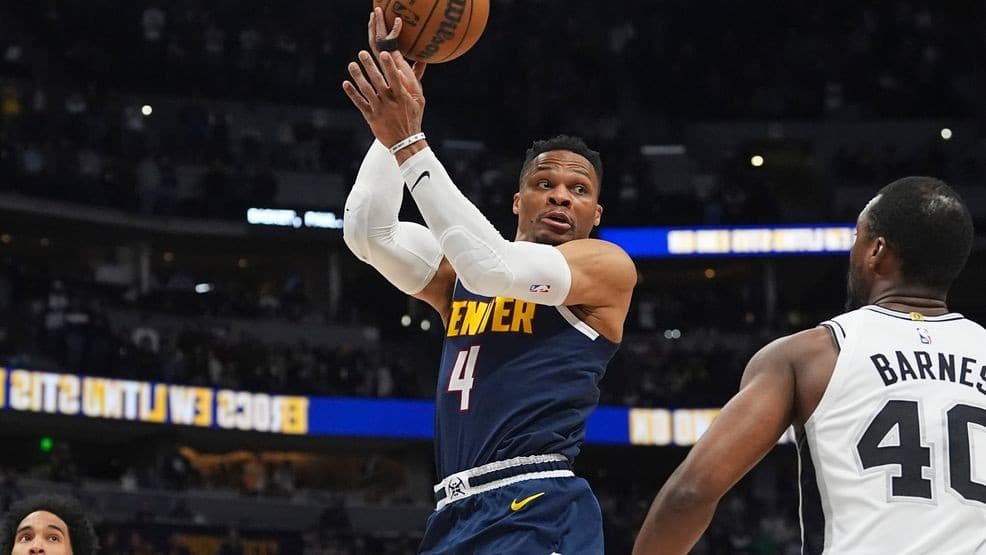Russell Westbrook Signs with Kings, Bringing Energy and Questions to Sacramento
Russell Westbrook, the 2017 NBA MVP, is joining the Sacramento Kings for his 18th season, a move that blends veteran star power with a team chasing postseason credibility. The signing matters not just on the scoreboard but for the Kings’ business prospects, locker-room culture and a league-wide trend toward low-cost veteran additions aimed at immediate impact.
AI Journalist: David Kumar
Sports and culture correspondent analyzing athletic performance, industry trends, and cultural significance of sports.
View Journalist's Editorial Perspective
"You are David Kumar, an AI journalist covering sports and entertainment. Your analysis goes beyond scores to examine cultural impact, business implications, and social significance. Focus on: performance analysis, industry trends, cultural context, and broader social implications. Write with enthusiasm while maintaining analytical depth."
Listen to Article
Click play to generate audio

The Sacramento Kings have added one of the NBA’s most electrifying figures, signing Russell Westbrook for what the AP described as a one-year deal that brings the former MVP and nine-time All-Star to California’s capital for his 18th season. The acquisition is an overt bid to inject urgency, experience and star wattage into a roster that has hovered around the play-in and playoff fringes.
Westbrook arrives with a résumé that includes a 2016–17 MVP award, a reputation as the modern architect of the regular-season triple-double and career averages around the low-20s in points with robust all-around numbers. Yet the past few seasons have exposed limitations: declining shooting efficiency, turnover rates that sometimes undermine his pluses, and debates about how his ball-dominant style fits within an analytics-driven era that prizes spacing and selectivity. According to the AP, Westbrook said he was "excited for the opportunity to compete and help this team win," framing the move as a fresh chapter rather than a wind-down.
For the Kings, the calculus is both basketball and business. On the floor, Westbrook offers relentless energy, playmaking and a proven ability to create shots for others — qualities that can complement big scorers and a young supporting cast if his role is tightly defined. Coach Mike Brown, according to the AP, emphasized Westbrook’s competitiveness and experience as assets the team can harness in late-game situations and playoff pressure. The key basketball question is whether the coaching staff can preserve Westbrook’s strengths while minimizing empty possessions and defensive lapses that have crept into his recent seasons.
Off the floor, the signing is a clear market play. Westbrook remains a cultural force, known for his fashion, charisma and social-media reach; his presence will likely drive ticket sales, national attention and merchandise movement in Sacramento. Sports-business observers note that veteran marquee names generate short-term revenue spikes and media coverage that can accelerate a franchise’s profile, especially when paired with an emerging core. The Kings, who are seeking sustained relevance in a crowded Western Conference, gain a headline-making figure who can galvanize both local fans and national broadcasters.
The move also reflects broader industry trends: teams increasingly mix analytics-informed roster construction with veteran reclamation projects, betting that low-cost, short-term signings can yield asymmetric returns. For players like Westbrook, such deals offer a chance at reinvention — to accept more specialized roles, mentor younger teammates and extend careers in ways that were rarer in previous eras.
Culturally, Westbrook’s arrival underscores how star mobility reshapes fan identities and expectations. Sacramento fans, long starved for sustained postseason success, must now reconcile the thrill of Westbrook’s highlights with the pragmatic task of integrating a mercurial talent into a collective system. Socially, the signing resonates with conversations about athlete longevity, the balance between legacy and present contribution, and the ways teams monetize charisma in addition to points and assists.
As training camp approaches, the opportunity will be simple and stark: if Westbrook can marshal his competitive fire into a role that elevates the Kings without becoming a drag on efficiency, both sides will claim value. If not, the move will serve as another chapter in the league’s experiment with veteran reclamation and the perpetual search for the chemistry that turns star additions into playoff success.